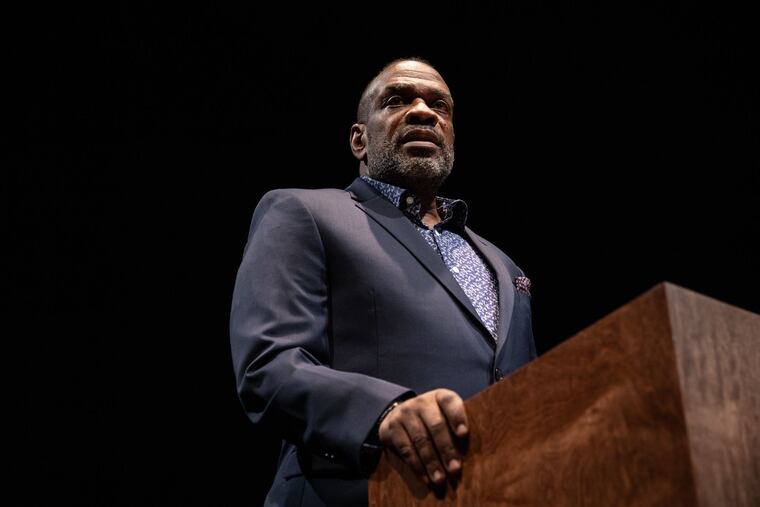Review: ‘Baldwin and Buckley at Cambridge’ at Fringe Festival is awkward and ahistorical
The play depicts one of the greatest debates in modern history.

On Feb. 18, 1965, writer James Baldwin, one of the most powerful figures of the civil rights movement, and William F. Buckley Jr., considered by most to be the father of 20th-century patrician conservatism, squared off in England at Cambridge University to debate the motion: “The American Dream Has Been Achieved at the Expense of The American Negro.”
Fifty-four years later, Elevator Repair Service, a New York-based company with a history of adapting unconventional texts for the stage, presents the world premiere of “Baldwin and Buckley at Cambridge,” part of the 25th annual Philadelphia Fringe Festival.
The play is a verbatim presentation of what is now considered one of the greatest debates in modern history. As such, it is, unfortunately, just as relevant in the Black Lives Matter era and the confrontation of white privilege as it was in 1965.
Audiences should be forewarned that the debate between Baldwin, who affirms the motion, and Buckley, who denies it, does not follow the formula of verbal sparring most of us are accustomed to. True to the original event, there is no point/counterpoint. Instead, each speaker lays out his argument uninterrupted in a format that is more oratory contest than dramatic interplay.
Greig Sargeant gives us an impassioned, more emotional Baldwin, whose words held the audience spellbound at turns. On the flip side, Ben Jalosa Williams was a picture perfect Buckley, acutely playing the conservative’s arrogant nonchalance down to his slouching posture while waiting to speak.
In one of two lesser roles, Gavin Price is Mr. Heycock, an earnest undergraduate student who affirms Baldwin’s motion and speaks before presenting him.
Inexplicably, a Black actor (Christopher-Rashee Stevenson) plays Mr. Burford, the undergraduate who gave a speech in agreement with Buckley’s position, to jarring effect. His appearance knocks the audience out of the play completely, and kills its historical context.
Given that Burford was not Black, this is a confusing and unsettling choice with the current climate of racial division in this country. Stevenson co-signs Buckley’s stance in a fashion uncomfortably close to coonery. Whether this is a directorial misstep or a conscious political statement on the part of director John Collins is unclear.
Also problematic is the decision to add a fictional addendum that occurs after the debate. While the scene may have been added to bring some sense of the contemporary to the proceedings, it dilutes the evening’s discourse. Why not simply allow the words of Baldwin and Buckley to resonate with the audience?
In what feels like an “in case you missed the point” moment, lights pinpoint down to a solitary Baldwin on stage, then come up in what is presumably his apartment. In this scene, Baldwin and playwright Lorraine Hansberry (April Matthis) share scotch and conversation about the relentless struggle of African Americans to gain the equality that should be their birthright.
It’s a tiring conversation that morphs oddly into the actors dropping their characters and speaking as themselves. Their lament? “We don’t need white people to be liberal. We need them to be radical.”
If the last words of the discussion were uttered by Baldwin and Buckley without distraction, the audience could truly wrestle over which side of the fence they reside.
Baldwin and Buckley at Cambridge
FringeArts, 140 N Columbus Blvd, Philadelphia
Through Sept. 11, 2021
Tickets: $39
Info: 215-413-1318